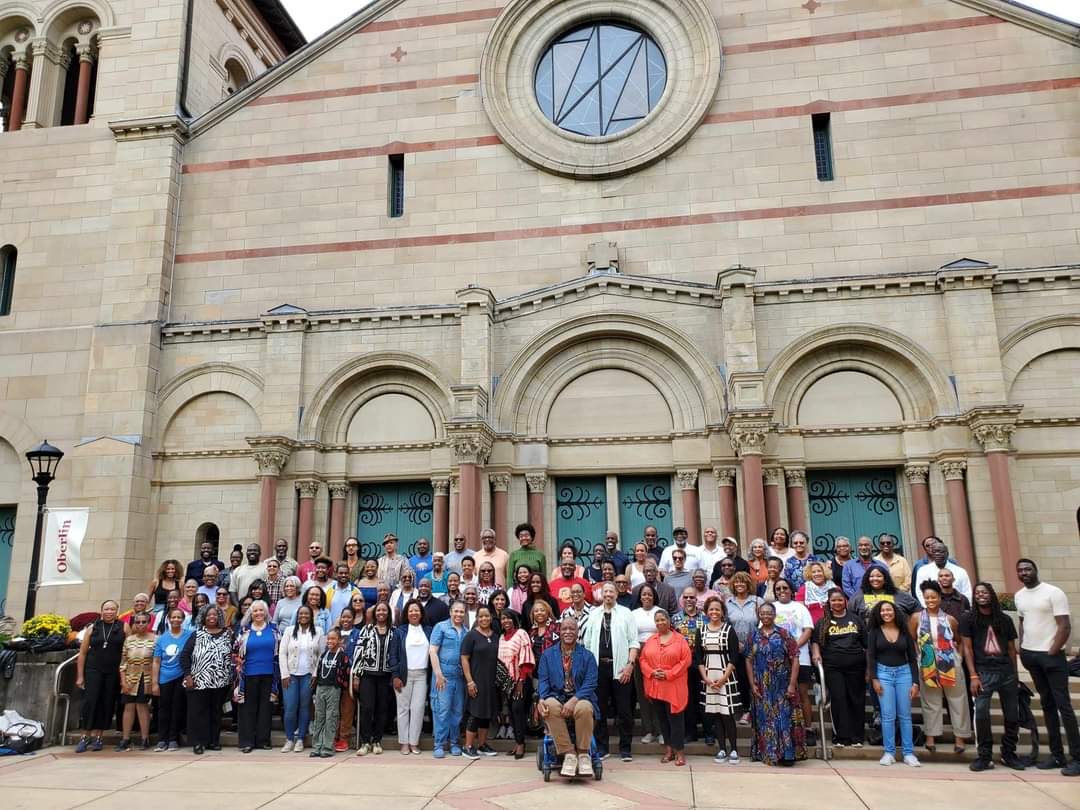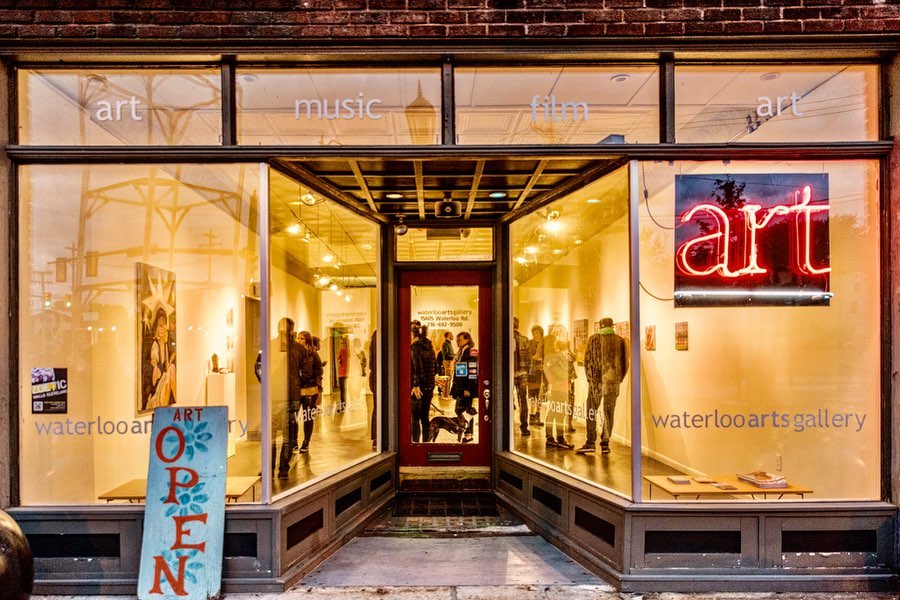This past weekend, the Oberlin Alumni Association of African Ancestry reunited on campus in person for the first time in nearly a decade. Attendance of the event exceeded the expectations of OA4 co-chairs Carolyn Ash, OC ’91, and Ambre Dromgoole, OC ’15, who didn’t realize the scope of what they had accomplished until the moment all reunion attendees were gathered in one place.
“The various reunion clusters were taking pictures with a professional photographer in front of Finney [Chapel], so OA4 had a chance to take a picture,” Ash said. “I really wasn’t paying attention to how big we were on the steps, until a friend of OA4 … took a picture of us getting our picture taken. And it was only then that I realized, we literally took up the whole width of the steps in front of Finney [Chapel].”
OA4, organized in 1987 and gaining affiliate status in the broader Alumni Association in 1997, has a variety of alumni and campus-facing roles. As an affinity group, they hold a seat on the Alumni Leadership Council, where they work to ensure diversity within the Alumni Association. OA4 also manages funds available to Black Oberlin students, opens and maintains career pathways for current Obies through mentorship programs, and acts as a support network for one another — whether that be organizing local reunions in areas densely populated with alumni, or showing up in person to OA4 members’ book releases or Broadway performances.
OA4 leadership had already planned the agenda, booked venues, and even arrived on campus for their 2020 reunion, when the event was abruptly forced to move to Zoom. Organizers were proud of the virtual reunion they held, which served as a model for other alumni groups to hold their own quarantine-era get-togethers. But for Ash, this weekend’s reunion, which marked the first time OA4 convened in person since 2015, had a distinctly different feel.
“I got an Uber from the airport and it was like, right when you could start seeing the heart of campus, I literally was in the car tearing up,” Ash said. “I’ve come back for Alumni Leadership Council meetings, and those have been great. But this reunion weekend hit me totally different because it was the people — my people, my family — back home.”
This sense among OA4 members that they were reuniting with family in the place they called home was strongly felt throughout OA4’s various weekend events. An early appearance from President Carmen Twillie Ambar at Friday night’s OA4 welcome dinner set a tone of intimacy.
“President Ambar was there with her sneakers on,” Ash said. “She even started by saying she had people at her house waiting for her, but she wanted to make sure that she welcomed us officially. So that was really beautiful.”
The following night, both alumni and current students flocked to Afrikan Heritage House to attend a Soul Session — an open mic event that has become an OA4 reunion tradition.
“It was completely packed — I don’t even think that there was standing room,” Ash recalled. “It was amazing to see everybody get together.”
A presentation from author and educator Kofi Lomotey, OC ’74, on an education initiative he launched during his time at Oberlin called the Shule Program, left a particularly strong impression on attendees.
“[Shule] was an African-centered school for young Black children in the Oberlin community, and it was run by Black Oberlin students,” Ash said. “And again, he started this in the ’70s. Sometimes when time passes on, you kind of just lose the history of things, so Kofi basically did a presentation in Lord Lounge in Afrikan Heritage House that was amazing. It was packed.”
Andrea Hargrave, OC ’97, and former OA4 president, echoed Ash’s sentiments about the impact of events that showcase little-known history of Black Oberlin alumni — particularly an event commemorating the 200th birthday of George Boyer Vashon, Oberlin’s first Black graduate.
“It was so impactful to think about a free Black person, who in the early 1800s, graduated from Oberlin, and then going to help start a law school in Washington, D.C.,” Hargrave said. “To remember that that’s the legacy of whose shoulders I stand on reminds me of where I come from, and gives me a greater sense of purpose.”
A crucial function of OA4 is oversight of various funds available to Black students at Oberlin, which include the MLK Endowed Internship Fund, which funds summer experiences for Pell Grant-eligible students; the John Mercer Langston Fund, which covers unforeseen emergency expenses; and the endowed 1835 fund, which commemorates the first year Oberlin began admitting Black students, and is open to all Black students on campus.
However, OA4’s connection with the Oberlin student body takes many forms besides financial support. Coming out of this weekend, OA4 leadership has plenty of momentum for establishing new official channels between current students and potential OA4 mentors — especially after a networking brunch in collaboration with the Office of Career Exploration and Development, where OA4 members sat at career cluster tables while students circulated, asking questions and meeting professionals in their desired fields.
At least one official channel for OA4 mentorship already exists: a Conservatory mentorship program, launched in 2022, which pairs Black students in the Conservatory with OA4 mentors who provide support over four years and link students with potential performance engagements. Saturday’s OA4 Black Alumni Concert emerged as another potential source of professional development opportunities for Black Conservatory students.
Dromgoole, who graduated from Oberlin with a degree in Musical Studies and Religion, explained the significance of establishing a network of alumni connected with the Conservatory.
“I’m currently talking to some of the people that have been involved in the Black Alumni Concert about developing resources and access, and finding pathways to sustaining a relationship with the Conservatory so that Black alumni can be in conversation and dialogue with current students, and vice versa,” Dromgoole said. “A lot of that energy is still percolating, and it’s a good feeling to have, when you feel like it wasn’t just an event, but it’s also going to be something that’s sustainable long-term.”
Hargrave expressed the association’s hope to make their presence more pronounced as a rich, multifaceted resource for current Oberlin students.
“One of the things that disconnected during the pandemic … was the connection with the students,” Hargrave said. “A lot of the students who engaged with us, this was their first time realizing just how committed to them the OA4 alums are. So making sure to continue to nurture that will be a key tenet of the group moving forward. I’m hearing from some of the students, like the ones I talked to for the career event, that they didn’t even know what OA4 was. We can change that.”










